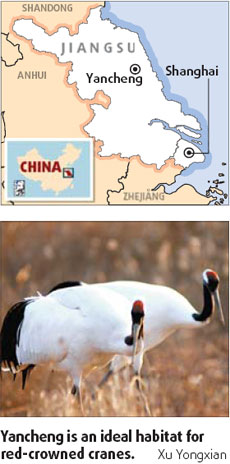If you are visiting my hometown, Yancheng, a city in north Jiangsu Province, East China, for the first time you must visit the Milu deer reserve in suburban Dafeng County.
The reserve now keeps about 1,000 Milu deer, accounting for one third of the species. The deer is known in Chinese as "sibuxiang", which means "it resembles nothing".
The animal has been described as having the hoofs of a cow, the head of a horse, the antlers of a deer and the body of a donkey. It died out in its native China in the 1900s, but in the 1980s, 39 deer from Europe were reintroduced.
The best time to see these cute animals is spring, when numerous kinds of grass turn green and many birds only seen in wetlands fly about. They are shy and do not like to be disturbed but you can observe them from a distance with binoculars.
If the deer reserve cannot satisfy your curiosity for the wetlands, I would suggest another stop, at Sheyang, a suburban county where over half of the world's red-crowned cranes spend the winter.
Chinese people love cranes for their elegance. In Taoism, the red-crowned crane is a symbol of longevity. In art and literature, immortals are often depicted riding on cranes.
My hometown has a coastline along the China Yellow Sea of 582 km, which is the longest among cities in Jiangsu. Seafood, therefore, is often served in local households.
As opposed to the spicy recipes of Sichuan cuisine, crabs and prawns are usually stewed in water with scallions and ginger.
The mixture of vinegar and ginger is perfect, as it preserves the taste of seafood and counteracts the food's "cold" nature. Generally, here, "less is more".
One of the most interesting customs in my hometown is called "stealing the autumn". On the night of Autumn Begins (in the traditional Chinese calendar) people can steal fruit and the owners of public or private orchards are not allowed to prosecute.
The custom dates back to the Yuan Dynasty (1271-1368), during which a group of soldiers stole vegetables and fruits because they were hungry. When their leader tried to punish them, local farmers tried to stop him, saying the soldiers had behaved well and protected them. One peasant said: "Stealing in autumn is not stealing." So, the soldiers were forgiven and the custom has prevailed since.
It should be said, however, this custom is reserved only for children nowadays, not for adults trying to make a fast buck from the harvest.
(China Daily by Liu Wei January 3, 2008)


